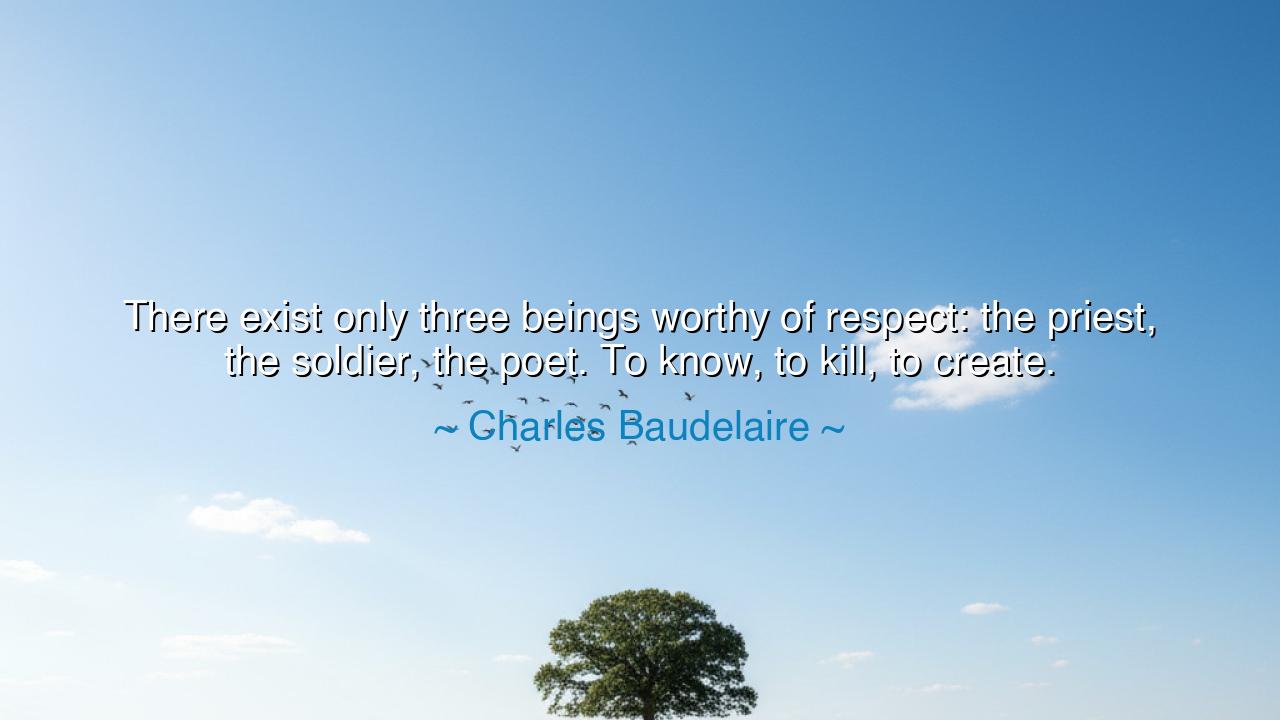
There exist only three beings worthy of respect: the priest, the
There exist only three beings worthy of respect: the priest, the soldier, the poet. To know, to kill, to create.






The words of Charles Baudelaire, “There exist only three beings worthy of respect: the priest, the soldier, the poet. To know, to kill, to create,” strike with the force of thunder and the mystery of ancient prophecy. In these three figures—the priest, the soldier, and the poet—he names the pillars upon which civilizations rise and fall. For the priest embodies the hunger for truth and the sacred; the soldier embodies the courage to protect and destroy when necessary; the poet embodies the divine fire to shape beauty and meaning. To know, to kill, to create—these are the eternal functions of the human spirit, without which no society can endure.
The priest is not merely the guardian of ritual, but the seeker of wisdom. He represents the human longing to pierce the veil of existence, to seek what is hidden, to carry the knowledge of eternity into the heart of the mortal. From the shamans of tribes to the philosophers of Athens, from Moses upon Sinai to the sages of the East, the priestly figure has been the one who knows—who dares to inquire into the mysteries of life and death, who dares to bind the soul to something greater than itself. Baudelaire reveres him not for power, but for his role as the vessel of knowledge.
The soldier, feared and honored, is the one who bears the sword. To kill in Baudelaire’s words is not wanton slaughter, but the terrible responsibility of defending life by facing death. The soldier embodies discipline, sacrifice, and courage. From the hoplites at Thermopylae to the defenders of their homelands in every age, the soldier represents humanity’s will to survive, to protect what is sacred, to lay down one’s life for a cause greater than the self. Society respects him because he acts where others falter, confronting the abyss of violence so that others may live in peace.
The poet, the most enigmatic of all, is the one who creates. He is the dreamer who takes chaos and gives it form, the visionary who shapes words, images, and music into the mirrors of the soul. Without the poet, humanity forgets its purpose and sinks into dullness. From Homer singing the wrath of Achilles, to Dante mapping the heavens and hells, to Shakespeare breathing life into kings and fools alike—the poet is civilization’s heartbeat, the creator of meaning where there is none. To create is the highest defiance against the void.
Together, these three form a triad of power. The priest gives vision, the soldier ensures survival, the poet gives beauty. Without the priest, society is blind; without the soldier, it is defenseless; without the poet, it is soulless. Baudelaire, with his gift for piercing paradox, distills the essence of life into these three callings: to know, to kill, to create. Each is extreme, each dangerous, yet each necessary. They reveal the spectrum of human greatness: knowledge, strength, and imagination.
History itself testifies to this triad. In the French Revolution, priests lost their power, soldiers gained the streets, and poets lit the flames of new ideals. The upheaval showed both the necessity and the danger of each role—knowledge without morality, killing without restraint, creation without order. But when balanced, these three bring civilization to its highest flowering. Think of Periclean Athens: philosophers sought knowledge, soldiers defended the city, and poets raised monuments of drama and song that still echo through time.
The lesson for us is profound: while not all are priests, soldiers, or poets by title, each of us is called to embody their essence. Cultivate the priest within by seeking wisdom and truth. Awaken the soldier within by practicing courage and discipline, defending what is just. Nurture the poet within by creating beauty, whether in words, in deeds, or in the shaping of a better world. To know, to kill, to create—this triad exists in every human heart, waiting to be brought into harmony.
Practical actions follow. Commit yourself to learning, so that ignorance does not rule you. Stand firm when adversity comes, protecting those who cannot protect themselves. And above all, create—write, build, paint, teach, or love in such a way that your life itself becomes art. Respect the priest, the soldier, and the poet in others, and in yourself, for they are the eternal forms of human greatness.
Thus, Baudelaire’s words resound like an oracle: “There exist only three beings worthy of respect: the priest, the soldier, the poet. To know, to kill, to create.” Take them as both challenge and calling, that your life may partake of wisdom, courage, and creativity. For in these three is contained the fullness of the human spirit, the essence of what it means to live with dignity before the face of time.






AAdministratorAdministrator
Welcome, honored guests. Please leave a comment, we will respond soon